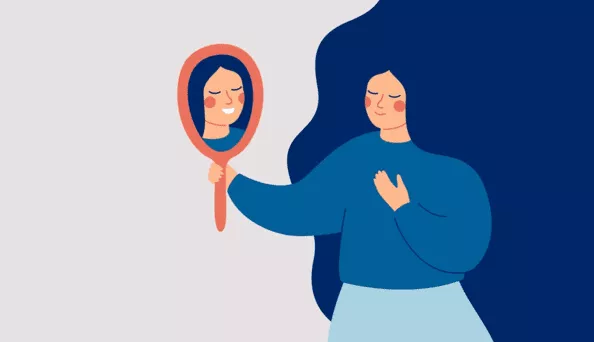Do people often describe you as “selfish” or “careless,” even though you’d like to be liked by everyone? If so, you might have Narcissistic Personality Disorder. You can rest assured, though—you’re not alone! Many people suffer from this condition, but there are ways to manage it.
What is Narcissistic Personality Disorder?
Narcissistic personality disorder (NPD) is a mental condition in which people have an inflated sense of their importance, a deep need for admiration, and a lack of empathy for others. But behind this mask of ultra-confidence lies a fragile self-esteem that’s vulnerable to the slightest criticism.
A narcissistic personality disorder is one of several types of personality disorders. Personality disorders are conditions in which people have traits that cause them to feel and behave in socially distressing ways, limiting their ability to function in relationships and other areas of their life, such as work or school.
NPD is a Cluster B personality disorder, which means it’s part of a group of disorders characterized by dramatic, emotional, or erratic thinking or behavior. Other Cluster B disorders include Borderline Personality Disorder (BPD), Histrionic Personality Disorder (HPD), and Antisocial Personality Disorder (APD).
What is a Narcissistic
A narcissistic individual, as defined by psychology, is someone who displays traits and behaviors associated with narcissism or narcissistic personality disorder (NPD). Narcissistic individuals have an exaggerated sense of self-importance, an insatiable need for admiration and attention, and a lack of empathy for others. They tend to have an inflated self-image and believe they are inherently superior to others.
Narcissistic individuals often seek constant validation and admiration from others. They have a strong desire to be seen as special and unique, expecting special treatment and recognition. They may exhibit arrogant or haughty behavior, projecting an air of superiority and entitlement.
Another defining characteristic of narcissism is a lack of empathy.
What is the definition of Narcissistic
Narcissistic is an adjective that describes someone who exhibits traits associated with narcissism or narcissistic personality disorder (NPD). What defines a narcissistic person is their excessive self-involvement, grandiose self-image, constant need for admiration, and lack of empathy for others.
What is a Narcissistic Behavior
Narcissistic behavior refers to the actions, attitudes, and patterns of behavior exhibited by individuals with narcissistic traits or narcissistic personality disorder (NPD). It encompasses a range of behaviors that reflect an excessive focus on oneself, a sense of entitlement, a lack of empathy for others, and a constant need for admiration and attention. Here are some common manifestations of narcissistic behavior:
What are some common Signs of Narcissistic Behavior
Some common signs of narcissistic behavior include:
- Exaggerated Sense of Self-Importance: Narcissists often have an inflated view of their own importance and believe they are special, unique, or superior to others.
- Constant Need for Attention and Admiration: They seek constant validation and attention from others. They crave admiration, praise, and recognition and may go to great lengths to obtain it.
- Lack of Empathy: Narcissists struggle to empathize with the emotions and experiences of others. They may be dismissive of others’ feelings or disregard their needs.
- Sense of Entitlement: They have a strong sense of entitlement, believing they deserve special treatment, privileges, and recognition. They may expect others to cater to their needs and may become angry or resentful if their expectations are not met.
- Exploitative Behavior: Narcissists may exploit others for personal gain. They may manipulate or take advantage of others to achieve their own goals, often without remorse or consideration for the well-being of others.
- Arrogance and Superiority: They exhibit a haughty or arrogant attitude, often belittling or demeaning others. They may engage in behavior that asserts their perceived superiority over others.
- Envy and Jealousy: Narcissists may feel envious of others, particularly those who they perceive as more successful or superior. They may be resentful or try to undermine the achievements of others.
- Lack of Accountability: They often struggle to take responsibility for their actions and may deflect blame onto others. They may avoid admitting mistakes or deflect criticism.
- Difficulty Maintaining Healthy Relationships: Narcissistic behavior can strain relationships as they may prioritize their own needs and disregard the feelings and boundaries of others. They may struggle with genuine emotional intimacy and have a pattern of unstable or short-lived relationships.
What is Narcissism
Narcissism refers to a personality trait characterized by a grandiose sense of self-importance, an excessive need for admiration and attention, and a lack of empathy for others.
In psychological terms, narcissism falls under the category of personality disorders and is often referred to as narcissistic personality disorder (NPD). Individuals with NPD typically display an exaggerated sense of self-importance and entitlement. They often have a strong desire for admiration and lack empathy for the feelings and needs of others.
Define Narcissism
Narcissism defines a personality trait or a psychological condition characterized by an excessive preoccupation with oneself, a grandiose self-image, a constant need for admiration, and a lack of empathy for others. It is named after Narcissus, a figure from Greek mythology who was known for his extreme self-involvement.
Narcissism involves an inflated sense of self-importance and a belief in one’s superiority over others. Individuals with narcissistic tendencies often seek constant attention, validation, and admiration from others. They may have a strong desire to be recognized as special or unique and expect special treatment and privileges.
Mild to Severe Negative Effects of Narcissism
People with Narcissistic Personality Disorder are often obsessed with power, beauty, and fame. They may be very successful on the surface, but underneath, they have low self-esteem and are often depressed.
The negative effects of narcissism can range from mild to severe:
- Mild: A mildly narcissistic person might be egotistical or boastful about their accomplishments but still function well in society.
- Moderate: A person with moderate narcissism might have trouble maintaining healthy relationships with others because they’re constantly putting themselves first instead of considering others’ needs and their own.
- Severe: A person with severe narcissism will have severe problems in all areas of life. From work or school performance issues, drug abuse problems, or alcoholism due to low self-esteem stemming from childhood trauma such as physical abuse or neglect during childhood development stages of life (infancy through adolescence).
Narcissistic Personality Disorder Symptoms
The Narcissistic Personality Disorder Symptoms are wide-ranging and often difficult to identify. The following list includes some of the symptoms associated with narcissism. Keep in mind that someone can have many of these without having Narcissistic Personality Disorder. Also, remember that some people may describe themselves as narcissistic and may not have any mental health problems.
Has a grandiose sense of self-importance (e.g., exaggerates achievements and talents, expects to be recognized as superior without commensurate achievements)

Is preoccupied with fantasies of unlimited success, power, brilliance, beauty, or ideal love
Believes that they are “special” and unique and can only be understood by other special people
Requires excessive admiration
Has a sense of entitlement (i.e., unreasonable expectations of especially favourable treatment or automatic compliance with their expectations)
They are interpersonally exploitative (i.e., take advantage of others to achieve their ends)
Lacks empathy: is unwilling to recognize or identify with the feelings and needs of others.
Is often envious of others or believes that others are envious of them
An inflated sense of self-importance that often leads to arrogance in social situations (for example, thinking that everyone should listen to your opinion)
Believe that they are special or unique and can only be understood by other special people or institutions
Causes of NPD
It’s estimated that between 1% and 6% of the U.S. population suffers from NPD. And while it’s often seen as something that impacts only celebrities and other public figures, it’s prevalent in everyday life.
Here are some of the most common causes of NPD:
- Genetics:Narcissism can run in families, so if your parents were self-absorbed or narcissistic, there’s a good chance you are too.
- Trauma: When people experience trauma during childhood or adolescence, they may develop narcissistic traits to cope with their feelings of low self-worth and vulnerability. In this case, therapy can help them work through their past experiences, so they don’t continue to act out these traits in adulthood.
- Personality Type:If you’re high-strung or anxious by nature, it could be easier for narcissists to manipulate your emotions than those who aren’t easily upset by criticism or failure.
- Abuse:Studies have shown that people with narcissistic personality disorder often experienced abuse as children. It’s still unclear whether the abuse caused their narcissism or if they were born with a predisposition towards it.
- Other mental health conditions:People who have a narcissistic personality disorder may also have other mental health issues such as depression or anxiety disorders.
It’s not your fault if you have Narcissistic Personality Disorder!
It’s a disorder that can affect people of any age, gender, or background, but it usually appears during adolescence. The causes of the disorder are still unknown, but it’s thought to be caused by a combination of environmental and genetic factors.
There are also some theories about how the brain works in people with NPD. For example, some researchers believe that people with NPD have an overactive reward system in their brains, which means they’re more sensitive to getting rewards (like praise from other people).
For more information about Mental Health Conditions. Visit our Mental Health Library page. To understand and cope with your Dependent Personality Disorder, get help from our Top 10 Psychiatrists, Psychologists, and Therapists who are known for providing the best mental health treatment and psychiatry services. To book an appointment please call us at (800) 457-4573 or submit an appointment request


Leave a Reply to Thomas Cancel reply